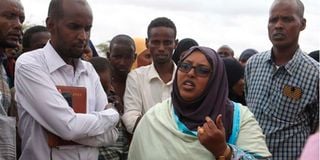When traditional dispute resolution methods are a double-edged sword

Mandera Woman Rep Amina Gedow calls for abolishment of Maslaha in the county after a woman was stabbed to death allegedly by her husband. Ms Gedow was addressing mourners in Mandera on July 9, 2018.
What you need to know:
- Every community in Kenya has some semblance of Alternative Dispute Resolution mechanisms.
- The formal Kenyan justice system is perceived as complicated, lengthy and often inconclusive.
The Constitution recognises Alternative Dispute Resolution (ADR) mechanisms for many reasons, including that they are efficient and would greatly help in decongesting the courts. That was alluded to and reinforced by then-Chief Justice Willy Mutunga on the commencement of the Judicial Marches Week in 2012.
Every community in Kenya has some semblance of ADR mechanisms. ADR refers to any means of settling disputes outside of the courtroom. For instance, communities’ councils of elders act as channels through which traditional dispute resolution is delivered. As a young advocate who has recently worked in Garissa County for a short time, it has been quite an experience encountering Maslaha.
Maslaha is practised by the Somali community in the northeastern region to settle disputes. Male elders act as mediators and use traditional means to solve the problems set before them. Compensation is a large aspect of problem-solving, whereby ‘payment’ is done by way of money or livestock.
Why is Maslaha preferred by the communities? First, it is a part of the Somali culture. Secondly, it applies a concept of justice that is easily understood. Thirdly, it advocates justice that is geared towards reconciliation and community cohesion as opposed to formal justice systems that lay emphasis on retributive justice and punishment.
Additionally, it involves components of monetary compensation, which directly benefits the aggrieved parties and offers a form of consolation. But with the courts, incarceration or punishment of the perpetrator of a crime against the aggrieved is deemed sufficient action to resolve the matter. Finally, the formal Kenyan justice system is perceived as complicated, lengthy and often inconclusive.
Maslaha is instrumental in maintaining peace and cohesiveness through its reconciliatory dispute resolution approach. But there are some questionable aspects attached to it.
Skewed outcomes
For instance, Maslaha is applied even to murder and sexual offences. This is problematic as there are legal instruments that prescribe penalties for such offences. The Penal Code sets murder as a capital offence punishable by life imprisonment or death while the Sexual Offences Act sets out sexual offences and punishment that accompanies them.
Secondly, it is heavily male-dominated. Women are almost almost non-existent in the councils of elders that are the decision-makers; hence skewed outcomes and lack of realisation of justice when it comes to gender-sensitive matters such as sexual and gender-based violence and even felonies. For instance, there is a disparity of punishment, whereby a larger or smaller amount of livestock should be paid by a perpetrator to a victim’s family based on the deceased’s gender.
Whilst Maslaha continues to be invaluable in the realisation of justice, the blanket application thereof should be critiqued as it raises pertinent questions such as what limitations and parameters exist in its application?
The law recognises and supports alternative dispute resolution in Article 159 of the Constitution. However, they should not be used in a way that contravenes the Bill of Rights or is repugnant to justice and morality, or is inconsistent with the Constitution or any written law. The Judicature Act has a similar stance, in Section 3(2), stating that the use of African customary law in dispute resolution ideally applies only in civil cases.
The Judiciary, ODPP and non-state stakeholders in the justice sector need to enhance awareness and sensitisation on aspects of human rights, gender and the law in communities where ADR methods are preferred.
Finally, training of elders in traditional dispute resolution mechanisms on the Constitution and other legal instruments is imperative as they are the custodians of the law in their communities. It is only through direct engagement with them and their subsequent capacity building on the law that justice can be achieved without discrimination. Traditional dispute resolution mechanisms are certainly viable avenues of justice if they are practised within the confines of the law.
Ms Oswago, an advocate of the High Court of Kenya, is the legal officer at the East African Centre for Human Rights (EACHRights). [email protected].





